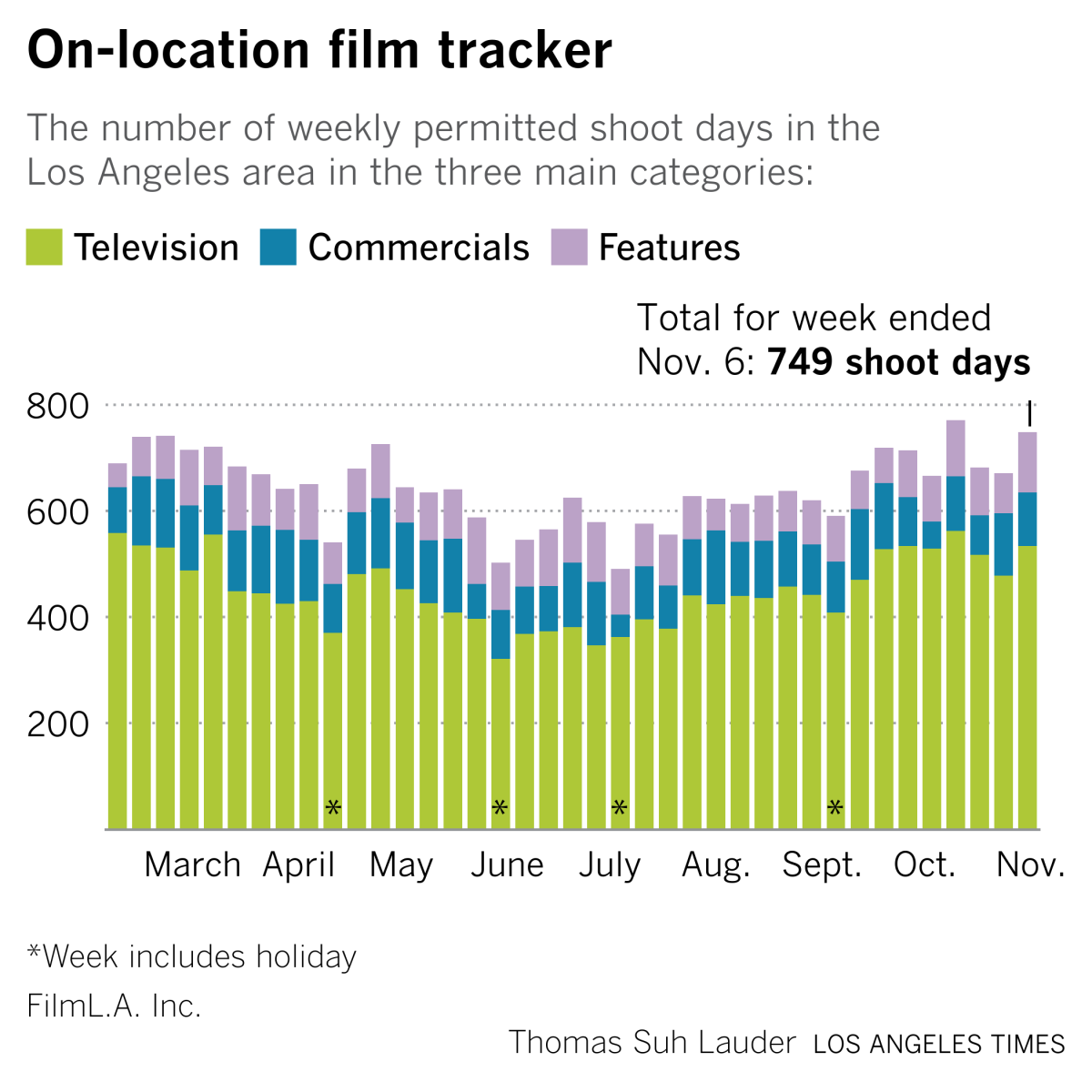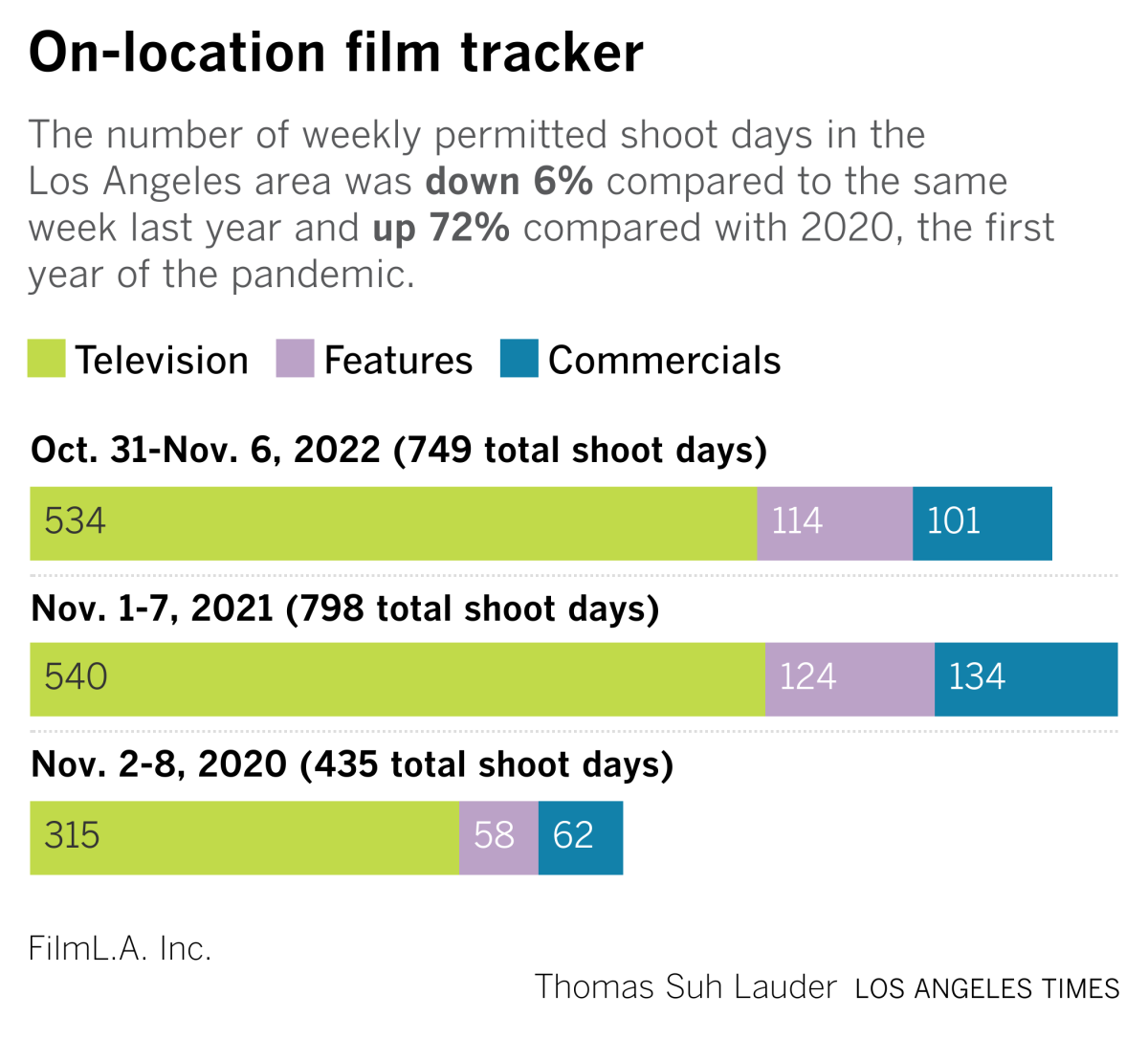Hollywood’s 2022 double trouble: recession fears and streaming’s awkward age

- Share via
Welcome to the Wide Shot, a newsletter about the business of entertainment. Sign up here to get it in your inbox.
Happy Disney earnings day, Wide Shot readers. Also there’s an election happening.
Today in the business of entertainment, MoviePass’ former executives are charged with securities fraud, Jimmy Kimmel will repeat as Oscars host (sorry to anyone who was betting on Chris Rock taking the gig) and Dave Chappelle has been tapped to host “Saturday Night Live.” People have thoughts. “Black Panther: Wakanda Forever” opens this weekend, in what will surely be a relief to theaters. Speaking of theaters, AMC is planning to use some of its auditoriums as Zoom rooms. Somehow, breakout rooms feel good in a place like this.
On with the newsletter...
Stumbling toward the future
It’s been an eventful earnings session for media and entertainment companies. Politicians and economists can debate endlessly whether a true recession is afoot, but for Hollywood, the big slowdown is already getting real and it’s showing up in quarterly results.
Advertisers are spooked by economic weakness and inflation. Results from Snap and YouTube showed just how much. Sectors that thrived during COVID-19 shutdowns are now seeing mass layoffs.
When it became the media giants’ turn, it was anything but a smooth ride.
The numbers illustrate the interesting valley that the entertainment industry is in right now as it makes its transition from the old ways of bundles and linear TV to the new era of going direct-to-consumer. Ad revenue and pay-TV subscriptions are falling but still making money. Streaming is hemorrhaging money but growing, though it’s still not clear whether it will be enough to make up for the collapse of the business model it’s supposed to replace.
Call it the awkward adolescent age of the streaming business — coincidentally, Netflix has been streaming for about 15 years — or the entertainment industry’s midterm reality check, whatever tortured metaphor you prefer.
Here’s a digest of how the entertainment sector is gangly stumbling through this period:
- Paramount Global revenue was $6.92 billion, up 5% from a year ago but falling short of analysts’ expectations. TV revenue fell 5% year-over-year to $4.9 billion because of cord cutting and weakness in the ad market. Paramount+ added 4.6 million subscribers to reach 46 million total, while overall Paramount direct-to-consumer subscribers hit 67 million.
- NBCUniversal had a mixed quarter, with sales for Comcast’s entertainment business dipping 4% to $9.57 billion and television revenue dropping 23% to $5.23 billion, but that was largely because the Tokyo Olympics were last year. Peacock grew to 15 million paid subscribers
- Warner Bros. Discovery lost $2.3 billion, largely from costs from the April merger. Revenue missed expectations, which the company blamed on the broader economic issues and cord cutting. Streaming subscriptions increased by 2.8 million to reach a combined 94.9 million.
- The rest: Self-styled content “arms dealer” Sony Pictures saw revenue rise and profit shrink, though the company raised its full-year profit projections for the unit. Lionsgate, which may spin off its studio business, took $1.7 billion in writedowns, including $1.5 billion from its Starz acquisition and $219 million for pulling its streaming service out of seven countries. Roku‘s stock tanked after executives put out a weak forecast.
Meanwhile, the losses from streaming kept piling up in the most recent quarter:
- Paramount: -$343 million.
- Peacock: -$614 million.
- Warner Bros. Discovery: -$634 million.
It’s in this uncertain environment that you get quotes like this one from Warner Bros. Discovery Chief Executive David Zaslav:
“Let’s face it. The strategy to collapse all windows, starve linear [television] and theatrical [box office] and spend money with abandon, while making a fraction in return, all in the service of growing sub numbers, has ultimately proven, in our view, to be deeply flawed.” Especially with $50 billion in debt hanging around the company’s neck.
Zaslav’s approach to fixing this problem is one of aggressive cost cutting and pruning of the company’s lineup of shows, with an eye toward making more use of franchises like DC and “Harry Potter.” “We did not get rid of any show that was helping us,” Zaslav told analysts. Ouch.
As if to emphasize that point, HBO last week canceled the expensive and faltering “Westworld,” despite a loyal fan base, after the company had already binned “Batgirl” and purged hundreds of “Sesame Street” episodes from HBO Max. Zaslav promised more streamlining, raising the company’s savings target from $3 billion to $3.5 billion. Investors usually love news of layoffs, but the stock fell anyway.
Zaslav may ultimately be proved correct about the streaming business model. Streaming and traditional media are often portrayed as being in opposition, but the truth for most companies is that these models have to coexist for either one to be healthy. Finding the right balance, though, is clearly going to cause some pain.
Stuff we wrote
— Walt Disney Co. drops COVID-19 vaccination mandate from many TV shows as shutdown fears recede. The use of vaccination mandates was agreed to by unions and producers as part of the so-called Return to Work agreement last year. About a dozen shows are affected and other protocols including masking and testing will remain in place.
— Why free streaming channels could be the future of broadcast TV news. ABC, CBS and NBC are giving more resources and big stars to their news streaming channels, which are no longer terrain for the B-team.
— LAPD cover-up of claims against Les Moonves highlights challenges for abuse victims. Five years after the #MeToo movement took off, women still face obstacles when they seek to bring complaints of misconduct against powerful figures.
— ICYMI: Twitter employees show solidarity after mass layoffs. MSNBC parts ways with weekend host Tiffany Cross. CNBC pulls the plug on ‘The News With Shepard Smith.’ The Times’ downtown L.A. printing facility will shut down in 2024.
We’ve done enough numbers this week, right? Let’s move on.
Films shoots
On-location production in Los Angeles increased last week, but was still down from the same time last year, according to FilmLA data.


Best of the web
— What possessed Britney Spears’ father to seize control of her life? (Vulture)
— Is Sarah Staudinger the new queen of Los Angeles? (New York Times)
— TikTok pays artists ‘almost nothing’ in music royalties. (Billboard)
— The case against the Twitter apology. (The New Yorker)
Finally ...

My colleague Sammy Roth, in his Boiling Point newsletter, wrote about a fascinating study from USC that looked into how Hollywood is addressing climate change. The answer: it isn’t. The Media Impact Project at USC’s Norman Lear Center went through 37,453 scripted television episodes and films released from 2016 through 2020, Roth reported. Among the findings: just 2.8% of those scripts mentioned climate change or related keywords, such as “greenhouse gas,” “sea level” and “clean energy.”
It’s certainly true that, aside from movies like “Don’t Look Up” and “First Reformed,” climate politics don’t really factor much into mainstream entertainment, unless you count Thanos’ overpopulation fix in the “Avengers” series or whatever. I suspect some mentions of climate change weren’t flattering toward those who care about the issue, either. I remember a plotline of “The Santa Clarita Diet” that turned one of the main characters into an ecoterrorist.
There are plenty of reasons why the entertainment industry is ignoring the climate crisis. It’s tough to do big-budget stories about environmental catastrophe while selling tickets, unless you’re James Cameron, the filmmaker who has been the most successful at making “FernGully”-style messaging into populist fare with “Avatar.” The other important question is whether imbuing TV shows with environmentalist keywords would make any difference. Hollywood’s elite may think their efforts are better spent funding politicians and climate initiatives.
But if storytelling can make the climate problem seem solvable, that might be a worthwhile pursuit, according to Erica Rosenthal, one of the report’s authors, who spoke to Roth for his story. “People often feel overwhelmed by the problem, particularly with all the apocalyptic storytelling, the sense that it’s all hopeless,” Rosenthal said. “That can really hinder the ability to take action. In order for people to take action, they need to believe that change is possible.”
Inside the business of entertainment
The Wide Shot brings you news, analysis and insights on everything from streaming wars to production — and what it all means for the future.
You may occasionally receive promotional content from the Los Angeles Times.




